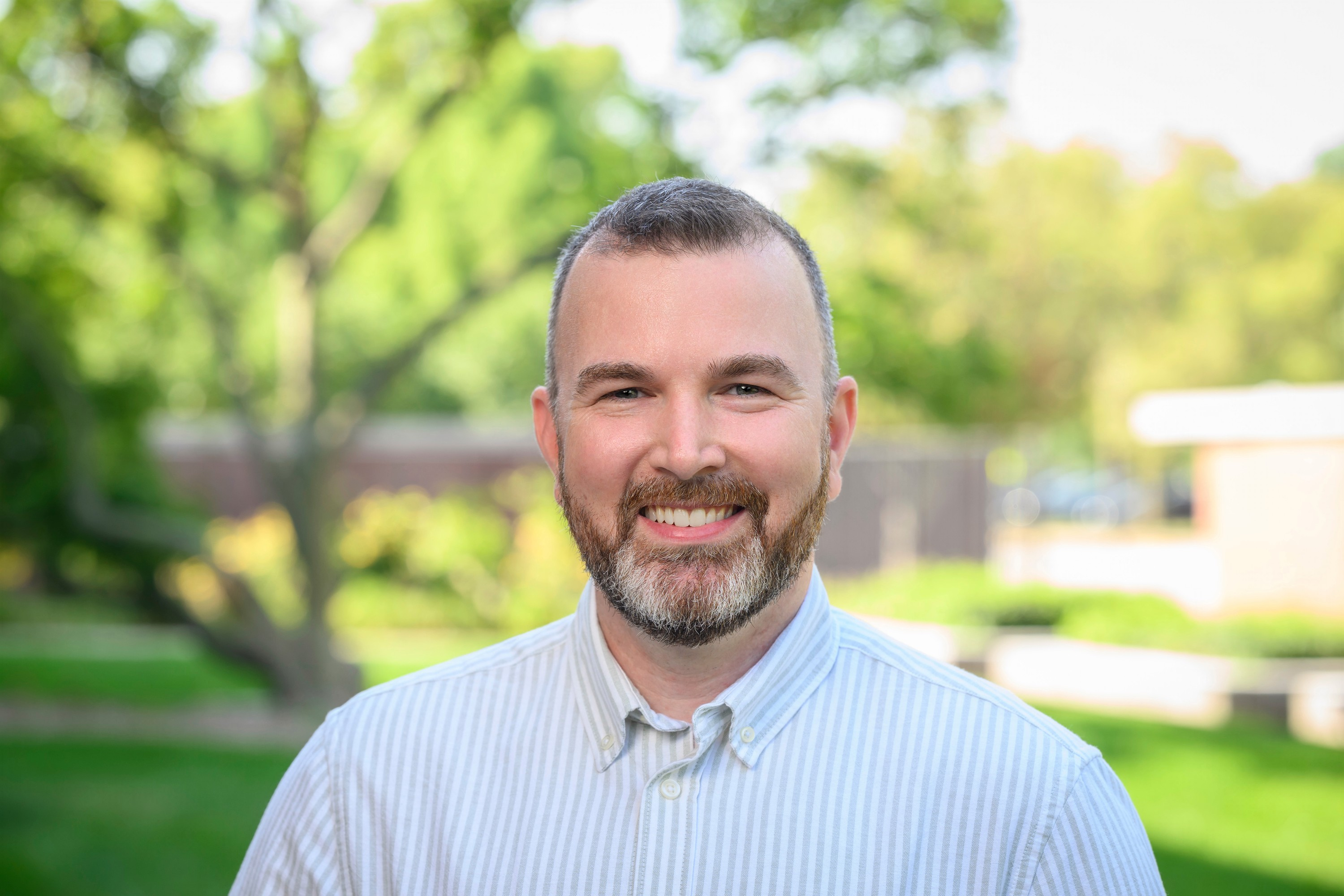Article

On a murky October morning in east-central Illinois, Dylan Burton spies a flash of orange and steps off the forest path, boots sliding on a layer of fallen leaves. He reaches his target — a ruffled, butterscotch-colored mushroom dripping down a gnarled elm — and claims it with a small paring knife.
Burton has foraged fungi on multiple continents for more than two decades. Now a postdoctoral researcher at the Beckman Institute for Advanced Science and Technology studying the niche field of second language testing, he credits his position to “a lifetime of gathering — experiences, ideas, perspectives, and even mushrooms.”
Gathering languages
 Dylan Burton.
Dylan Burton.Midway through a mathematics major at Hendrix College in Conway, Arkansas, Burton realized that his interests leaned toward the linguistic.
Burton grew up two-and-a-half hours southwest of Conway in the small town of Lewisville, where he had little exposure to languages other than English. His mother is from the Pacific Northwest and is a member of the Confederated Tribes of the Colville Reservation, but “she didn’t grow up speaking Sinixt, the language her grandparents spoke as their first language,” he said.
“But in college, I had fantastic language professors, and that’s where it all started. I had an aptitude for language-learning. I found Spanish fascinating, and I studied German, too.”
A polyglot with three languages under his belt, Burton graduated with a bachelor’s in mathematics. He joined the Japanese Exchange and Teaching Program, wherein he taught introductory English courses for children in Wakasa, Tottori and studied Japanese intensively for a year.
“Watching the kids learn firsthand and seeing their eyes light up when they were able to say something new in English was one of the most formative experiences for me as a language teacher,” he said.
Burton remained overseas for 15 years. He learned Catalan in the Spanish province of Catalonia. He sharpened his collegiate Spanish in Barcelona and foraged for mushrooms in the mountains outside the city. In Beijing, he studied Chinese. Soon, Burton’s tally of languages had increased to five.
Gathering data
While abroad, Burton’s linguistic interests shifted from teaching to testing.
Professional positions with Cambridge Language Assessment (now called Cambridge English) and the British Council exposed him to an interactive examination style that focuses on real communication rather than decontextualized grammar tests.
Motivated to learn how these tests are designed, Burton earned his master’s degree from Lancaster University in language testing, "the perfect union of linguistics and education with my mathematical, analytical background,” he said.
“It’s all about gathering data about people and using it to make an effective exam.”
But not all tests are effective for everyone. Burton’s subsequent Ph.D. work at Michigan State University examined how nonverbal behaviors might create unconscious biases in second language assessment that impact some groups more acutely than others: for example, for people with autism, “where factors like averted eye contact can subtly alter the ways someone’s communicative effectiveness is perceived, even if their language ability is on par with their peers,” he said.
Data like this, Burton realized, can transform language assessment into a tool for equity.
“If you consider who an assessment exists to serve, and that person’s specific needs, tests can be vehicles for the improvement of society,” he said.
Gathering experts
Burton’s postdoctoral appointment at the University of Illinois Urbana-Champaign continues to use language testing as a tool for equity.
As part of the university’s Training Qualified Interpreters Program, Burton designs language proficiency exams given to a specific subset of interpreters: the ones who help students receive the educational support they need.
Beckman researchers Kiel Christenson, chair of the Department of Educational Psychology and director of the Second Language Acquisition & Teacher Education program; and Xun Yan, a professor of linguistics and Burton’s primary collaborator, co-lead the program.
“The great thing about this project is its clear social aim,” Burton said. “Interpreters take the actual exams, but the tests exist to serve students from multilingual families.”
Specifically, students who require an individualized education plan, or IEP, for reasons including disabilities and developmental disorders. Guardians of students with IEPs must meet periodically with a representative from their school district; if English is not the family’s first language, an interpreter attends as well.
“But it’s well-documented that without appropriate interpretation services, parents may be provided inaccurate information about their children’s conditions,” Burton said.
For example, an interpreter who considers themselves fluent in a language may struggle to convey the nuances of neurodivergence.
In 2021, the Illinois State Board of Education rectified this by formalizing the first set of qualifications for IEP interpreters. ISBE contracted with the University of Illinois to create a training program tailored to those requirements. The five-year, $5 million Training Qualified Interpreters Program is the result.
Sensitivity training, special education best practices, and similarly demanding topics comprise the program’s curriculum. Because of this, applicants are expected to be proficient in their target languages from the start. Burton and his team create exams to evaluate just that. So far, Burton is focusing on testing interpreters who speak Spanish, Polish, Arabic, Urdu, and Russian — Illinois’ most spoken non-English languages.
“If we have an applicant who speaks English as a first language and will be translating into Polish,” he said, “we need to make sure that their … language skills are strong enough to interpret within a Chicago school district. If yes, we can train that person to go on and make a positive impact.”
Like a real school setting, language tests for interpreters are practical and fluid. The questions are a mix of spoken and written. Some use audio recordings to mimic parent-teacher dialogue.
Burton and his team will use the Beckman Institute’s advanced eye-tracking technology to observe how interpreters interact with test content while taking the exams. Tracking eye movement will enable them to revise the way test questions are presented, swap distracting visuals for helpful ones, and make sure the test is useful for all languages.
Gathering mushrooms
In addition to its immediate impact on Illinois families, Burton hopes his research will help scientists and policymakers revitalize the field.
“Using evidence to create language examinations, especially in the pursuit of equity and access, means being open to new information and accepting unanticipated truths,” he said.
Always open to new knowledge, Burton hopes to expand his language portfolio with Sinixt, his family’s native language, and his mushroom portfolio with the elusive morel.
“So far, I’ve found chicken-of-the-woods, giant puffball, and honey and oyster mushrooms," he said. "In a way, it’s like science. All curiosity, you’re constantly checking your work, and you never really know what you’re going to find.”
Beckman Institute for Advanced Science and Technology